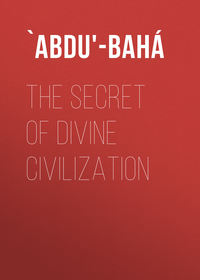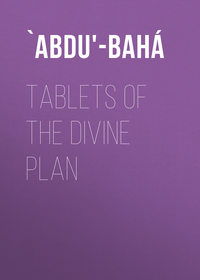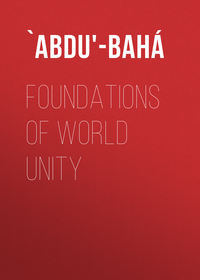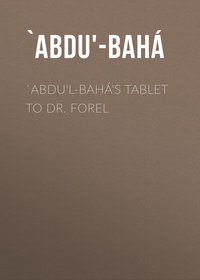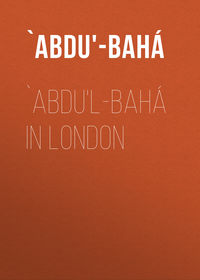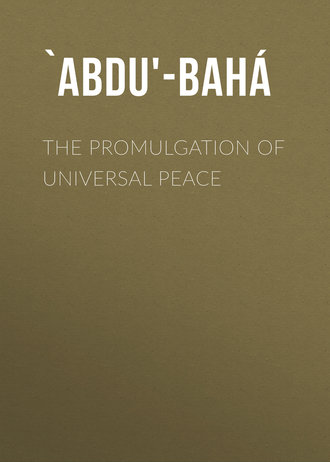 полная версия
полная версияThe Promulgation of Universal Peace
17 April 1912
Talk at Home of Mr. and Mrs. Edward B. Kinney
780 West End Avenue, New York
Notes by John G. GrundyIn the Holy Books it is recorded that when the Sun of Truth dawns, it will appear in the East, and its light will be reflected in the West. Already its dawning has taken place in the East, and its signs are appearing in the West. Its illumination shall spread rapidly and widely in the Occident. The Sun of Truth has risen in Persia, and its effulgence is now manifest here in America. This is the greatest proof of its appearance in the horizon of the world, as recorded in the heavenly Books. Praise be to God! That which is prophesied in the Holy Books has been fulfilled.
On Sunday last at Carnegie Hall the revered soul who introduced ‘Abdu’l-Bahá gave voice to the statement that according to tradition demons would appear from the land of the sunrise, but now we find angels appearing instead. At the time this statement was made a reply was not possible, but today we will speak of it. The great spiritual lights have always appeared in the East. The Blessed Perfection, Bahá’u’lláh, appeared in the East. Jesus Christ dawned upon the horizon of the East. Moses, Aaron, Joseph and all the Israelitish prophets such as Jeremiah, Ezekiel, Isaiah and others appeared from the Orient. The lights of Muḥammad and the Báb shone from the East. The eastern horizon has been flooded with the effulgence of these great lights, and only from the East have they risen to shine upon the West. Now—praise be to God!—you are living in the dawn of a cycle when the Sun of Truth is again shining forth from the East, illumining all regions.
The world has become a new world. The darkness of night which has enveloped humanity is passing. A new day has dawned. Divine susceptibilities and heavenly capacities are developing in human souls under the training of the Sun of Truth. The capacities of souls are different. Their conditions are various. For example, certain minerals come from the stony regions of the earth. All are minerals, all are produced by the same sun, but one remains a stone while another develops the capacity of a glittering gem or jewel. From one plot of land tulips and hyacinths grow; from another, thorns and thistles. Each plot receives the bounty of the sunshine, but the capacity to receive it is not the same. Therefore, it is requisite that we must develop capacity and divine susceptibility in order that the merciful bounty of the Sun of Truth intended for this age and time in which we are living may reflect from us as light from pure crystals.
The bounties of the Blessed Perfection are infinite. We must endeavor to increase our capacity daily, to strengthen and enlarge our capabilities for receiving them, to become as perfect mirrors. The more polished and clean the mirror, the more effulgent is its reflection of the lights of the Sun of Truth. Be like a well-cultivated garden wherein the roses and variegated flowers of heaven are growing in fragrance and beauty. It is my hope that your hearts may become as ready ground, carefully tilled and prepared, upon which the divine showers of the bounties of the Blessed Perfection may descend and the zephyrs of this divine springtime may blow with quickening breath. Then will the garden of your hearts bring forth its flowers of delightful fragrance to refresh the nostril of the heavenly Gardener. Let your hearts reflect the glories of the Sun of Truth in their many colors to gladden the eye of the divine Cultivator Who has nourished them. Day by day become more closely attracted in order that the love of God may illumine all those with whom you come in contact. Be as one spirit, one soul, leaves of one tree, flowers of one garden, waves of one ocean.
As difference in degree of capacity exists among human souls, as difference in capability is found, therefore, individualities will differ one from another. But in reality this is a reason for unity and not for discord and enmity. If the flowers of a garden were all of one color, the effect would be monotonous to the eye; but if the colors are variegated, it is most pleasing and wonderful. The difference in adornment of color and capacity of reflection among the flowers gives the garden its beauty and charm. Therefore, although we are of different individualities, different in ideas and of various fragrances, let us strive like flowers of the same divine garden to live together in harmony. Even though each soul has its own individual perfume and color, all are reflecting the same light, all contributing fragrance to the same breeze which blows through the garden, all continuing to grow in complete harmony and accord. Become as waves of one sea, trees of one forest, growing in the utmost love, agreement and unity.
If you attain to such a capacity of love and unity, the Blessed Perfection will shower infinite graces of the spiritual Kingdom upon you, guide, protect and preserve you under the shadow of His Word, increase your happiness in this world and uphold you through all difficulties. Therefore, it is my hope that day by day you will become more and more effulgent in the horizon of heaven, advance nearer and nearer toward the Kingdom of Abhá, attain greater and greater bounties of the Blessed Perfection. I am joyful, for I perceive the evidences of great love among you. I go to Chicago, and when I return I hope that love will have become infinite. Then will it be an eternal joy to me and the friends in the Orient.
18 April 1912
Talk at Home of Mr. and Mrs. Marshall L. Emery
273 West Ninetieth Street, New York
Notes by Miss DixonTonight I wish to tell you something of the history of the Bahá’í Revelation.
The Blessed Perfection, Bahá’u’lláh, belonged to the nobility of Persia. From earliest childhood He was distinguished among His relatives and friends. They said, “This child has extraordinary power.” In wisdom, intelligence and as a source of new knowledge, He was advanced beyond His age and superior to His surroundings. All who knew Him were astonished at His precocity. It was usual for them to say, “Such a child will not live,” for it is commonly believed that precocious children do not reach maturity. During the period of youth the Blessed Perfection did not enter school. He was not willing to be taught. This fact is well established among the Persians of Ṭihrán. Nevertheless, He was capable of solving the difficult problems of all who came to Him. In whatever meeting, scientific assembly or theological discussion He was found, He became the authority of explanation upon intricate and abstruse questions presented.
Until His father passed away, Bahá’u’lláh did not seek position or political station notwithstanding His connection with the government. This occasioned surprise and comment. It was frequently said, “How is it that a young man of such keen intelligence and subtle perception does not seek lucrative appointments? As a matter of fact, every position is open to him.” This is an historical statement fully attested by the people of Persia.
He was most generous, giving abundantly to the poor. None who came to Him were turned away. The doors of His house were open to all. He always had many guests. This unbounded generosity was conducive to greater astonishment from the fact that He sought neither position nor prominence. In commenting upon this His friends said He would become impoverished, for His expenses were many and His wealth becoming more and more limited. “Why is he not thinking of his own affairs?” they inquired of each other; but some who were wise declared, “This personage is connected with another world; he has something sublime within him that is not evident now; the day is coming when it will be manifested.” In truth, the Blessed Perfection was a refuge for every weak one, a shelter for every fearing one, kind to every indigent one, lenient and loving to all creatures.
He became well-known in regard to these qualities before the Báb appeared. Then Bahá’u’lláh declared the Báb’s mission to be true and promulgated His teachings. The Báb announced that the greater Manifestation would take place after Him and called the Promised One “Him Whom God shall make manifest,” saying that nine years later the reality of His own mission would become apparent. In His writings He stated that in the ninth year this expected One would be known; in the ninth year they would attain to all glory and felicity; in the ninth year they would advance rapidly. Between Bahá’u’lláh and the Báb there was communication privately. The Báb wrote a letter containing three hundred and sixty derivatives of the root Bahá. The Báb was martyred in Tabríz; and Bahá’u’lláh, exiled into ‘Iráq in 1852, announced Himself in Baghdád. For the Persian government had decided that as long as He remained in Persia the peace of the country would be disturbed; therefore, He was exiled in the expectation that Persia would become quiet. His banishment, however, produced the opposite effect. New tumult arose, and the mention of His greatness and influence spread everywhere throughout the country. The proclamation of His manifestation and mission was made in Baghdád. He called His friends together there and spoke to them of God.
At one point He left the city and went alone into the mountains of Kurdistán, where He made His abode in caves and grottoes. A part of this time He lived in the city of Sulaymáníyyih. Two years passed during which neither His friends nor family knew just where He was.
Although Bahá’u’lláh was solitary, secluded and unknown in His retirement, the report spread throughout Kurdistán that this was a most remarkable and learned Personage, gifted with a wonderful power of attraction. In a short time Kurdistán was magnetized with His love. During this period Bahá’u’lláh lived in poverty. His garments were those of the poor and needy. His food was that of the indigent and lowly. An atmosphere of majesty haloed Him as the sun at midday. Everywhere He was greatly revered and beloved.
After two years He returned to Baghdád. Friends He had known in Sulaymáníyyih came to visit Him. They found Him in His accustomed environment of ease and affluence and were astonished at the appointments of One Who had lived in seclusion under such frugal conditions in Kurdistán.
The Persian government believed the banishment of the Blessed Perfection from Persia would be the extermination of His Cause in that country. These rulers now realized that it spread more rapidly. His prestige increased; His teachings became more widely circulated. The chiefs of Persia then used their influence to have Bahá’u’lláh exiled from Baghdád. He was summoned to Constantinople by the Turkish authorities. While in Constantinople He ignored every restriction, especially the hostility of ministers of state and clergy. The official representatives of Persia again brought their influence to bear upon the Turkish authorities and succeeded in having Bahá’u’lláh banished from Constantinople to Adrianople, the object being to keep Him as far away as possible from Persia and render His communication with that country more difficult. Nevertheless, the Cause still spread and strengthened.
Finally, they consulted together and said, “We have banished Bahá’u’lláh from place to place, but each time he is exiled his cause is more widely extended, his proclamation increases in power, and day by day his lamp is becoming brighter. This is due to the fact that we have exiled him to large cities and populous centers. Therefore, we will send him to a penal colony as a prisoner so that all may know he is the associate of murderers, robbers and criminals; in a short time he and his followers will perish.” The Sulṭán of Turkey then banished Him to the prison of Akká in Syria.
When Bahá’u’lláh arrived at Akká, through the power of God He was able to hoist His banner. His light at first had been a star; now it became a mighty sun, and the illumination of His Cause expanded from the East to the West. Inside prison walls He wrote Epistles to all the kings and rulers of nations, summoning them to arbitration and universal peace. Some of the kings received His words with disdain and contempt. One of these was the Sulṭán of the Ottoman kingdom. Napoleon III of France did not reply. A second Epistle was addressed to him. It stated, “I have written you an Epistle before this, summoning you to the Cause of God, but you are of the heedless. You have proclaimed that you were the defender of the oppressed; now it hath become evident that you are not. Nor are you kind to your own suffering and oppressed people. Your actions are contrary to your own interests, and your kingly pride must fall. Because of your arrogance God shortly will destroy your sovereignty. France will flee away from you, and you will be overwhelmed by a great conquest. There will be lamentation and mourning, women bemoaning the loss of their sons.” This arraignment of Napoleon III was published and spread.
Read it and consider: one prisoner, single and solitary, without assistant or defender, a foreigner and stranger imprisoned in the fortress of Akká, writing such letters to the Emperor of France and Sulṭán of Turkey. Reflect upon this: how Bahá’u’lláh upraised the standard of His Cause in prison. Refer to history. It is without parallel. No such thing has happened before that time nor since—a prisoner and an exile advancing His Cause and spreading His teachings broadcast so that eventually He became powerful enough to conquer the very king who banished Him.
His Cause spread more and more. The Blessed Perfection was a prisoner twenty-five years. During all this time He was subjected to the indignities and revilement of the people. He was persecuted, mocked and put in chains. In Persia His properties were pillaged and His possessions confiscated. First, there was banishment from Persia to Baghdád, then to Constantinople, then to Adrianople, finally from Rumelia to the prison fortress of Akká.
During His lifetime He was intensely active. His energy was unlimited. Scarcely one night was passed in restful sleep. He bore these ordeals, suffered these calamities and difficulties in order that a manifestation of selflessness and service might become apparent in the world of humanity; that the Most Great Peace should become a reality; that human souls might appear as the angels of heaven; that heavenly miracles would be wrought among men; that human faith should be strengthened and perfected; that the precious, priceless bestowal of God—the human mind—might be developed to its fullest capacity in the temple of the body; and that man might become the reflection and likeness of God, even as it hath been revealed in the Bible, “Let us make man in our image.”
Briefly, the Blessed Perfection bore all these ordeals and calamities in order that our hearts might become enkindled and radiant, our spirits be glorified, our faults become virtues, our ignorance be transformed into knowledge; in order that we might attain the real fruits of humanity and acquire heavenly graces; in order that, although pilgrims upon earth, we should travel the road of the heavenly Kingdom, and, although needy and poor, we might receive the treasures of eternal life. For this has He borne these difficulties and sorrows.
Trust all to God. The lights of God are resplendent. The blessed Epistles are spreading. The blessed teachings are promulgated throughout the East and West. Soon you will see that the heavenly Words have established the oneness of the world of humanity. The banner of the Most Great Peace has been unfurled, and the great community is appearing.
19 April 1912
Talk at Earl Hall
Columbia University, New York
From Stenographic NotesIf we look with a perceiving eye upon the world of creation, we find that all existing things may be classified as follows: first, mineral—that is to say, matter or substance appearing in various forms of composition; second, vegetable—possessing the virtues of the mineral plus the power of augmentation or growth, indicating a degree higher and more specialized than the mineral; third, animal—possessing the attributes of the mineral and vegetable plus the power of sense perception; fourth, human—the highest specialized organism of visible creation, embodying the qualities of the mineral, vegetable and animal plus an ideal endowment absolutely absent in the lower kingdoms—the power of intellectual investigation into the mysteries of outer phenomena. The outcome of this intellectual endowment is science, which is especially characteristic of man. This scientific power investigates and apprehends created objects and the laws surrounding them. It is the discoverer of the hidden and mysterious secrets of the material universe and is peculiar to man alone. The most noble and praiseworthy accomplishment of man, therefore, is scientific knowledge and attainment.
Science may be likened to a mirror wherein the images of the mysteries of outer phenomena are reflected. It brings forth and exhibits to us in the arena of knowledge all the product of the past. It links together past and present. The philosophical conclusions of bygone centuries, the teachings of the Prophets and wisdom of former sages are crystallized and reproduced in the scientific advancement of today. Science is the discoverer of the past. From its premises of past and present we deduce conclusions as to the future. Science is the governor of nature and its mysteries, the one agency by which man explores the institutions of material creation. All created things are captives of nature and subject to its laws. They cannot transgress the control of these laws in one detail or particular. The infinite starry worlds and heavenly bodies are nature’s obedient subjects. The earth and its myriad organisms, all minerals, plants and animals are thralls of its dominion. But man through the exercise of his scientific, intellectual power can rise out of this condition, can modify, change and control nature according to his own wishes and uses. Science, so to speak, is the breaker of the laws of nature.
Consider, for example, that man according to natural law should dwell upon the surface of the earth. By overcoming this law and restriction, however, he sails in ships over the ocean, mounts to the zenith in airplanes and sinks to the depths of the sea in submarines. This is against the fiat of nature and a violation of her sovereignty and dominion. Nature’s laws and methods, the hidden secrets and mysteries of the universe, human inventions and discoveries, all our scientific acquisitions should naturally remain concealed and unknown, but man through his intellectual acumen searches them out of the plane of the invisible, draws them into the plane of the visible, exposes and explains them. For instance, one of the mysteries of nature is electricity. According to nature this force, this energy, should remain latent and hidden, but man scientifically breaks through the very laws of nature, arrests it and even imprisons it for his use.
In brief, man through the possession of this ideal endowment of scientific investigation is the most noble product of creation, the governor of nature. He takes the sword from nature’s hand and uses it upon nature’s head. According to natural law night is a period of darkness and obscurity, but man by utilizing the power of electricity, by wielding this electric sword overcomes the darkness and dispels the gloom. Man is superior to nature and makes nature do his bidding. Man is a sensitive being; nature is without sensation. Man has memory and reason; nature lacks them. Man is nobler than nature. There are powers within him of which nature is devoid. It may be claimed that these powers are from nature itself and that man is a part of nature. In answer to this statement we will say that if nature is the whole and man is a part of that whole, how could it be possible for a part to possess qualities and virtues which are absent in the whole? Undoubtedly the part must be endowed with the same qualities and properties as the whole. For example, the hair is a part of the human anatomy. It cannot contain elements which are not found in other parts of the body, for in all cases the component elements of the body are the same. Therefore, it is manifest and evident that man, although in body a part of nature, nevertheless in spirit possesses a power transcending nature; for if he were simply a part of nature and limited to material laws, he could possess only the things which nature embodies. God has conferred upon and added to man a distinctive power—the faculty of intellectual investigation into the secrets of creation, the acquisition of higher knowledge—the greatest virtue of which is scientific enlightenment.
This endowment is the most praiseworthy power of man, for through its employment and exercise the betterment of the human race is accomplished, the development of the virtues of mankind is made possible and the spirit and mysteries of God become manifest. Therefore, I am greatly pleased with my visit to this university. Praise be to God that this country abounds in such institutions of learning where the knowledge of sciences and arts may readily be acquired.
As material and physical sciences are taught here and are constantly unfolding in wider vistas of attainment, I am hopeful that spiritual development may also follow and keep pace with these outer advantages. As material knowledge is illuminating those within the walls of this great temple of learning, so also may the light of the spirit, the inner and divine light of the real philosophy glorify this institution. The most important principle of divine philosophy is the oneness of the world of humanity, the unity of mankind, the bond conjoining East and West, the tie of love which blends human hearts.
Therefore, it is our duty to put forth our greatest efforts and summon all our energies in order that the bonds of unity and accord may be established among mankind. For thousands of years we have had bloodshed and strife. It is enough; it is sufficient. Now is the time to associate together in love and harmony. For thousands of years we have tried the sword and warfare; let mankind for a time at least live in peace. Review history and consider how much savagery, how much bloodshed and battle the world has witnessed. It has been either religious warfare, political warfare or some other clash of human interests. The world of humanity has never enjoyed the blessing of universal peace. Year by year the implements of warfare have been increased and perfected. Consider the wars of past centuries; only ten, fifteen or twenty thousand at the most were killed, but now it is possible to kill one hundred thousand in a single day. In ancient times warfare was carried on with the sword; today it is the smokeless gun. Formerly, battleships were sailing vessels; today they are dreadnoughts. Consider the increase and improvement in the weapons of war. God has created us all human, and all countries of the world are parts of the same globe. We are all His servants. He is kind and just to all. Why should we be unkind and unjust to each other? He provides for all. Why should we deprive one another? He protects and preserves all. Why should we kill our fellow creatures? If this warfare and strife be for the sake of religion, it is evident that it violates the spirit and basis of all religion. All the divine Manifestations have proclaimed the oneness of God and the unity of mankind. They have taught that men should love and mutually help each other in order that they might progress. Now if this conception of religion be true, its essential principle is the oneness of humanity. The fundamental truth of the Manifestations is peace. This underlies all religion, all justice. The divine purpose is that men should live in unity, concord and agreement and should love one another. Consider the virtues of the human world and realize that the oneness of humanity is the primary foundation of them all. Read the Gospel and the other Holy Books. You will find their fundamentals are one and the same. Therefore, unity is the essential truth of religion and, when so understood, embraces all the virtues of the human world. Praise be to God! This knowledge has been spread, eyes have been opened, and ears have become attentive. Therefore, we must endeavor to promulgate and practice the religion of God which has been founded by all the Prophets. And the religion of God is absolute love and unity.
19 April 1912
Talk at Bowery Mission
227 Bowery, New York


